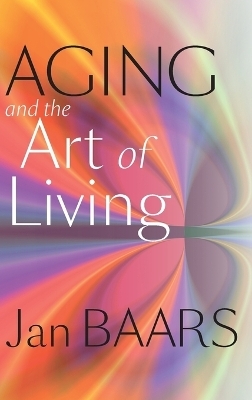
Aging and the Art of Living
Johns Hopkins University Press (Verlag)
978-1-4214-0646-6 (ISBN)
- Lieferbar (Termin unbekannt)
- Versandkostenfrei innerhalb Deutschlands
- Auch auf Rechnung
- Verfügbarkeit in der Filiale vor Ort prüfen
- Artikel merken
Gerontologists, philosophers, and students will find Baars' discussion to be a powerful, perceptive conversation starter.
Jan Baars is professor of interpretive gerontology at the University for Humanities in Utrecht. He is author and co-editor of almost twenty books, including Aging, Globalization, and Inequality: The New Critical Gerontology, in English, German, French, Finnish, and Dutch.
Acknowledgments
Introduction
The Chronocratic Emperor Has No Clothes
Overview
1. Chronometric Regimes: The Life Course, Aging, and Time
Introduction
1.1. Historical Backgrounds of the Chronometric Life Course
A Biographical Sandglass
Age in Social Legislation
Late Modern Systemic Worlds and Life Worlds
1.2. Chronometric Life Courses: Beyond Standardization and De-standardization
The Continuing Importance of Chronometric Age
Chronometric Regimes
1.3. Care and Its Chronometric Regimes
Chronometric Care and Its Acceleration
Time-efficient Lives
1.4. Chronometric Aging: Exactly Arbitrary
Intrinsic Time and Intrinsic Malleability
The Heisenberg Principle of Aging
Conclusions
2. Exclusion, Activism, and Eternal Youth
Introduction
2.1. From Natural Passivity to Activating Activities for Older People
From "Idleness with Dignity" to Being as Being Busy
Stay Active: "Use It or Lose It"
2.2. The Emergence of an Anti-aging Culture
"Don't Call 'em Old, Call 'em Consumers!"
"Take Years Off Your Looks and Add Them to Your Life"
2.3. The Much-desired Long and Invulnerable Life: Magic and Magic Technology
A Fundamental Vulnerability
Conclusions
3. A Passion for Wisdom and the Emergence of an Art of Aging
Introduction
3.1. Early Greek Thought about the Life Course
Solon's Untraditional Views
3.2. The Search for Wisdom and the Emergence of an Art of Life
Plato's Academy
Aristotle's Lyceum
The Garden of Epicurus
The Stoics
Wisdom, Aging, and Old Age
3.3. Cicero and the Stoic Art of Living in Old Age
Cicero
Cato Maior de Senectute: On Old Age
Cicero's Defense of Old Age against Four Complaints
A Statesman's View of Old Age
Conclusions
4. Modern Science, the Discovery of a Personal History,and Aging Authentically
Introduction
4.1. Aging in a World of Meaningful Repetition
4.2. (Ir)reversible Time and the Senescing of Organisms
Does Nature Repeat Itself Eternally?
Nature Changes and Time Is Irreversible
Senescing, Irreversible Time, and the Organism
4.3. The Idealization of Science and the Epistemological Reduction of Time
4.4. The Struggle for a Fuller Experience of Time
Augustine: A Threefold Present
Bergson: Time as Creativity
Husserl: The Phenomenological Experience of Time
Heidegger: Authentic Temporal Being in the Face of Death
Time Is Lived in Constitutive Life Worlds
Conclusions
5. Aging and Narrative Identities
Introduction
5.1. Embedding Aging in Narratives
Narratives and Narrative Identity
Narrative Integration as a "Good Life"
Life Plans
"Real Stories" and Textual Issues
5.2. Modest Necessity of Stories
Changes, Themes, and Phases
Stories: Intertwining the Past, the Present, and the Future
Institutional Narrative Practices
Narratives if the Life World and the Systemic World
Conclusions
6. Perspectives—Toward an Art of Aging
Introduction
6.1. Interhuman Vulnerability and the Dignity of "Unsuccessful" Aging
The Vulnerability of the Interhuman Condition
Aging and Increasing Vulnerability
The Dignity of "Unsuccessful" Aging
Autonomy and Structural Paternalism
6.2. Toward an Art of Aging: Beyond Conventional Wisdom
Older and Wiser?
6.3. Toward an Art of Aging: Living in Different Times
A Multi-layered Present
Kairos: A Sensitivity for Changing Temporal Qualities
Activism and Receptivity
Memories Have Their Own Times
Actions Constitute Time
Life Events and Life's Periods
The Times of Life Are Finite
A Last Question about the Beginning of Time
6.4. Toward an Art of Aging: Beyond Longer Lives
Aging as Finitization: A Deepening of Unique Lives
Unique Lives: Empirical and Ethical
Contingent and Existential Limitations
Why Do We Age? How Can Aging Be Meaningful?
Is It Good to Live Longer?
References
Index
| Erscheint lt. Verlag | 26.11.2012 |
|---|---|
| Zusatzinfo | 5 Illustrations, black and white |
| Verlagsort | Baltimore, MD |
| Sprache | englisch |
| Maße | 152 x 229 mm |
| Gewicht | 544 g |
| Themenwelt | Geisteswissenschaften ► Philosophie |
| Geisteswissenschaften ► Psychologie ► Entwicklungspsychologie | |
| Medizin / Pharmazie ► Medizinische Fachgebiete ► Geriatrie | |
| Sozialwissenschaften ► Soziologie | |
| ISBN-10 | 1-4214-0646-2 / 1421406462 |
| ISBN-13 | 978-1-4214-0646-6 / 9781421406466 |
| Zustand | Neuware |
| Haben Sie eine Frage zum Produkt? |
aus dem Bereich


